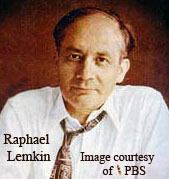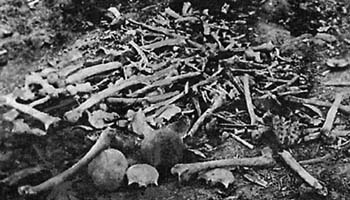Lemkin and Genocide
Today, we look for a word equal to the act. The University of Houston's Honors College presents this program about the machines that make our civilization run, and the people whose ingenuity created them.
When the course of human events implodes, we're left speechless -- quite literally. Take, for instance, the practice of murdering entire peoples. The word we use to describe such an act -- genocide -- was born in one man's tenacity and a people's horrific experience.
 Historian Samantha Powers tells about Raphael Lemkin, a university student in Poland. In 1920, he heard reports of the Ottoman Empire's massacre of Armenians. Why didn't the world react, he wondered. The answer he was given -- the overarching claim of national sovereignty -- was simply inadequate. How could sovereignty, he asked, "be conceived as the right to kill millions of innocent people"?
Historian Samantha Powers tells about Raphael Lemkin, a university student in Poland. In 1920, he heard reports of the Ottoman Empire's massacre of Armenians. Why didn't the world react, he wondered. The answer he was given -- the overarching claim of national sovereignty -- was simply inadequate. How could sovereignty, he asked, "be conceived as the right to kill millions of innocent people"?
By the late 1930s Lemkin was now a scholar of international law and the question became personal. His parents ignored Lemkin's pleas to flee Poland ahead of the Nazis. Lemkin managed to escape to the US; his family was murdered as part of the "Final Solution".
This must never again happen, Lemkin vowed. But, whatprecisely, had happened? How to name what seemed un-nameable? Lemkin recalled Winston Churchill's warning in 1941 that the world was in "the presence of a crime without a name." Finding the name, Lemkin believed, would be the first step to stopping the crime.
Lemkin was an amateur linguist who spoke a dozen languages. He'd long been struck by George Eastman's explanation of the word "Kodak." Eastman's criteria were concision, simplicity and close identification with the intended object. This approach worked for the camera, but could it denote -- give a name to -- t he annihilation of an entire people? Yes, Lemkin insisted. What was critical, he thought, was to find a word that had "the color of freshness and novelty", but was also "as short and poignant as possible." He ended his long search by fusing the Greek derivative geno, meaning "race," with the Latin derivative cide from the verb "to kill."
he annihilation of an entire people? Yes, Lemkin insisted. What was critical, he thought, was to find a word that had "the color of freshness and novelty", but was also "as short and poignant as possible." He ended his long search by fusing the Greek derivative geno, meaning "race," with the Latin derivative cide from the verb "to kill."
"Genocide" was thus named. But only much later did it become the mane of a crime treated under international law. In 1948, goaded by a relentless Lemkin, the UN finally passed the Convention on the Prevention and Punishment of the Crime of Genocide. The landmark decision outlawed all acts intended "to destroy, in whole or in part, a national, ethnical, racial or religious group."
Yet ratification by the US Congress didn't take place for forty years. Senator William Proxmire had to give 3,211 consecutive speeches confronting us with this national shame until, in 1988, the convention was passed. Lemkin, however, was not there to applaud. Broken and exhausted, he died in 1959. Seven people attended his funeral.
Given the train of man-made horrors since then, it's clear that naming is only a first step. But must it be the last step? Is language, as Caliban cries, good only for cursing? Or does responsibility begin with naming?
I'm Rob Zaretsky, at the University of Houston, where we're interested in the way inventive minds work.
S. Power, A Problem from Hell: America and the Age of Genocide. (New York: Harper Collins, 2002). (Stock footage of bones above, Image by JHL below)
